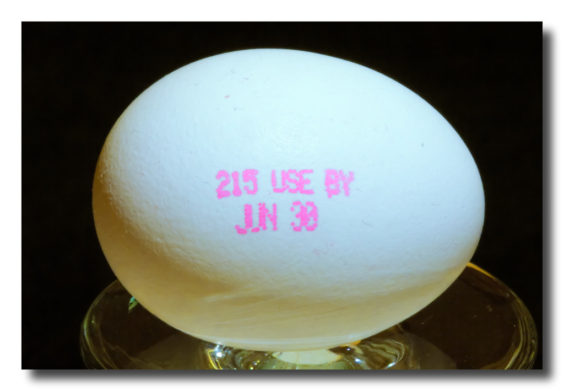
Sure, you clip coupons and shop the sales. But no matter how savvy a saver you are, even the best of us are guilty of overspending on some of our groceries in a big way, in one key respect.
How many times have you poured out the remaining contents of a container of milk that had passed its expiration date? Or tossed out an outdated box, can or jar of something that you discovered in the back of your pantry? As they say, the most expensive food you buy, is the food you throw away. And one new study says we’re throwing away a whole lot of groceries, and a lot of money in the process – and that there’s one simple solution to the problem.
The study, co-authored by the Natural Resources Defense Council and Harvard Law School’s Food Law and Policy Clinic, pins the blame on the expiration dates stamped on our groceries. “U.S. consumers and businesses needlessly trash billions of pounds of food every year as a result of America’s dizzying array of food expiration date labeling practices, which need to be standardized and clarified,” the researchers said.
Their report, titled “The Dating Game: How Confusing Food Date Labels Lead to Food Waste in America“, slams the current system of food date labeling. “Here’s a superbly-kept secret,” the study says. “All those dates on food products — sell by, use by, best before — almost none of those dates indicate the safety of food, and generally speaking, they’re not regulated in the way many people believe. The current system of expiration dates misleads consumers to believe they must discard food in order to protect their own safety. In fact, the dates are only suggestions by the manufacturer for when the food is at its peak quality, not when it is unsafe to eat.”
As a result, more than 90% of Americans are believed to be prematurely trashing perfectly good food, because they think out-of-date products are not safe to eat. The average American household of four spends between $1365 to $2275 a year, purchasing food that is ultimately thrown out. In total, research indicates that Americans toss up to 40% of our entire food supply – $165 billion worth – every year. And that’s not even counting the $900 million worth of expired, never-bought food that grocery stores discard. Some of it is donated, but much of it ends up prematurely trashed.
So what’s the problem with expiration dates, then?
The researchers take issue with the confusing, and largely unregulated, array of dates – “sell by”, “best by”, “use by”, etc. The vast majority of those dates, they say, are mere suggestions, not an indication of food safety. On packaged foods, “best by” and “use by” are meant to convey when a product is at peak quality. And “sell by”, the researchers argue, is not a date that consumers should be concerned with at all – in fact, they suggest “sell by” dates should be made invisible to shoppers, because they’re really just “a tool for stock control,” suggesting to stores when they should start rotating out their stock to ensure the products have a decent shelf life once they’re purchased. Some stores are better than others at doing this – and those that don’t risk putting off their customers (read: “Groceries Gone Bad: Does Your Store Sell Expired Food?”).
That’s not to say that food never goes bad. But the researchers say most food has a whole lot of life left to it, long after the often arbitrary date stamped on it. Conversely, the date becomes meaningless if the food isn’t stored and handled properly. If you buy some yogurt and keep it in your hot car while you run some other errands on the way home, for example, the “best by” date stamped on the product may give you a false sense of security that the product is still safe to eat, long after it really has gone bad.
“We need a standardized, commonsense date labeling system that actually provides useful information to consumers, rather than the unreliable, inconsistent and piecemeal system we have today,” said the report’s lead author, Emily Broad Leib. The report recommends using consistent, unambiguous language to clearly differentiate between safety-based and quality-based dates. It also advocates for a greater emphasis on safe handling instructions, that speak more to product safety than expiration dates do.
The proliferation of “scratch-and-dent” stores is already working to change the public image of expiration dates. And the former president of Trader Joe’s is even planning to open a nonprofit store that sells discounted, past-its-sell-by-date food to low-income shoppers (read: “Former Trader Joe’s Exec: Selling ‘Rich Man’s Garbage’ to the Poor?”). If it seems unsafe, or unseemly, consider the alternative, supporters say – all of this food, enough to fill entire grocery stores, could end up in the trash instead.
Finally, consider this – as mentioned earlier, Americans throw out as much as $165 billion worth of food every year. Meanwhile, coupon use saved Americans a total of $3.7 billion last year. If we never clipped a single coupon, and instead ate all of the food we buy, we’d collectively end up saving nearly 50 times more on our grocery bill.
Now that’s food for thought.











Whatever happened to common sense and personal responsibility? Why do people think they need legislation to solve every little problem that pops up? Do they not realize that, if we choose to regulate these dates, we will have a whole new layer of bureaucracy that will require more tax dollars. Then these bureaucrats are often allowed to make up the rules as they go, gradually constraining businesses and consumers more and more as time goes by. Lawmakers are more than happy to propose and pass such legislation because it gives them more power and appears that they have done something to make people safer. Don’t fall for it!
If you want to know how to handle this dilemma without legislation, see Couponer’s comment above. Problem solved!
I say give the product a good whiff. If it’s stinky, toss it. Otherwise, I keep eating it.
No kidding, Couponer! I check three things: 1) Is it fuzzy or slimy? and 2) Does it smell wrong? If the answers to 1 & 2 are No, then 3) I taste it. If it tastes all right then I am good to go!